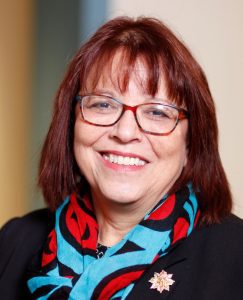 Equity, access, and visibility for and of indigenous peoples is the heart of the American Indian College Fund’s mission. We believe deeply in the power of indigenous knowledge and in the transformative power of education.
Equity, access, and visibility for and of indigenous peoples is the heart of the American Indian College Fund’s mission. We believe deeply in the power of indigenous knowledge and in the transformative power of education.
Fifty years ago when tribal colleges and universities (TCUs) were first established in the United States, tribal peoples were striving to create access to higher education in their communities. Now we strive to build greater access at TCUs and throughout higher education institutions.
The College Fund was started in 1989 by TCU leadership and allies in the private sector to bring together supporters of education and advocates of Native issues and the individuals most in need of resources to make a difference in their communities. This support takes the form of scholarships and student success services and programming resources for TCUs. Since 1989, the College Fund has distributed more than $100 million in scholarships to thousands of students. Between 8-10 percent of the College Fund’s scholarship resources also support Native students who are attending mainstream institutions. Today the College Fund supports 35 accredited tribal colleges that provide place-based and culturally rich education for Native and rural students.
We are inspired by our students to focus on how to help them go to college in safe and welcoming environments. We are inspired by their vision of better lives for themselves and their families to focus on how to build capacity for TCUs and the communities they serve. We recognize that TCUs thrive in environments where their very existence is at risk. Poverty, lack of access to infrastructure, health care, and housing, and food insecurity are all present in very real and challenging ways among the people TCUs serve.
Not only do we help students and TCUs by connecting them with resources, we help through advocacy and outreach. According to the U.S. Census, only about 14percent of American Indians and Alaska Natives have a bachelor’s degree compared to more than 30 percent of the general population. Our resources and our advocacy are critical to closing that gap – we must do more if we want to achieve parity with education attainment.
At the College Fund, we listen to Native students. TCU students go to school with each other in place-based settings. TCUs and their students are resources for all institutions that want to do a better job of serving indigenous peoples. Our advocacy for Native students comes from their words. Native students want to contribute their indigenous knowledge; they want a physical place to gather; they want to see themselves represented in faculty and staff and throughout public-facing materials; and they want evidence of institutional recognition of their existence through inclusion in curriculum and data, and with land acknowledgement.
At the College Fund, we understand that the historical experience of indigenous peoples with education is fraught with diminishment of identity, loss of family and social structures, and loss of cultural resources. We also recognize that in modern society, education can be a tool of restoration. Tribal colleges and Native students bring indigenous knowledge into our contemporary lives in ways that improve lives for all people.
At the College Fund, we are honored to share the stories of our students, our institutions, and our allies. You can learn more about how to support Native students and TCUs by visiting our website and the tribal colleges we support by visiting the website of their membership organization, the American Indian Higher Education Consortium.
Cheryl Crazy Bull, Wacinyanpi Win (They Depend on Her), Sicangu Lakota, is President & CEO of the American Indian College Fund. A lifelong educator and community activist, Cheryl is an advocate for self-determination focused on Native voice, philosophy, and traditions as the heart of the people’s work in building prosperity for current and future generations. An accomplished public speaker and writer, Cheryl also promotes tribal educational autonomy, community-based research, and family and youth empowerment. She believes all tribal nations should have their own tribal college and that education is the answer!
Cheryl graduated from the University of South Dakota with a degree in business management, earned her masters in education leadership from South Dakota State University, and has been recognized with an honorary cultural degree from Sinte Gleska University and an honorary doctorate from Seattle University.
